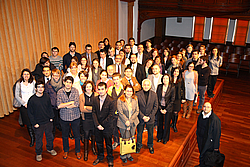
Connect one Threads
How SMART Start-up prompted Sustainable Fashion
Jeremy Pingul is a young entrepreneur that sells organic clothing. His dream is to connect sustainable clothing supply chains from cotton fields to consumers. In our interview he shared with us how he became involved in sustainability issues and how the CSCP SMART Start-up training programme helped him to put his plans into action.
CSCP: Jeremy, you made a great effort to understand the value chain for organic clothing. How did you get to be so passionate about this issue?
| Jeremy: It started in 2010 back in the US during my last year at university. I took a class called ‘American Consumerism’. There we discussed a lot about overconsumption and how our economic system |
promotes this constant drive to buy more and more.
In the end I wrote a paper about the waste of clothing. I learned that 80% of clothing in America ends up in landfills and even the part that goes to charity is not always helpful. I really got into the topic and for my final thesis I decided to focus on the clothing supply chain. I learned a lot about the problem of pesticides and genetically modified seeds in cotton production, subsidies and the shopping culture in western countries, and how that affects lives in other countries around the world.
After completing my studies, I decided that I wanted to learn more about sustainable supply chains for clothing, from the people who work in cotton production, textile manufacturing and the market trying to make a difference.
CSCP: And what did you experience following in your journey along the organic clothing value chain?
Jeremy: I started in Spain because, after some research it seemed that in Europe there is a better consciousness about clothing. I spoke with designers and organic clothing companies in Spain and France. I spoke with an NGO in the Netherlands and with designers in Berlin. From there I made my way to Turkey, which is one of the biggest producers of organic cotton in the world. Here I spoke with manufacturers and farm cooperatives where I gained better picture of the entire value chain.
The supply chain of organic clothing is very sustainable because it is produced beginning with the organically grown cotton itself, which is traceable. A certification process ensures that garments have been ethically produced all the way through to manufacturers and the end consumer.

CSCP: And in November 2011 you ended up in Istanbul with all these experiences. What are your plans now?
Jeremy: Based on my insights with the organic textile industry, I am starting a venture that would support sustainably sourced clothing from Turkey by connecting and helping them distribute to online and retail platforms. Basically, I want to help make it easier for people to support organic clothing and to help spread awareness in a clear and effective way.
CSCP: You participated in this year’s April SMART Start-up training course on sustainable entrepreneurship in Istanbul. Was it helpful and how did it influence your business idea?
Jeremy: What I really liked about the SMART Start-up training course was that I came with an idea and a lot of people gave their input and
helped me develop it into an even better idea. It was actually the first opportunity for me to open up my idea to other people. In the SMART Start-up Multi-Stakeholder Meeting on the Future of Sustainable Business and Entrepreneurship in the Mediterranean people allowed me to tell the story of my journey and my project, which was very important to me. I was able to speak to people with a wide range of perspectives and they allowed me to understand their point of view as well. Before coming to the training course, I had a more narrow focus because I grew with this project. I was working on it for at least a year and my assumptions might not have been the same as others. It’s great to see people beginning to understand your ideas as well. That was one of the things I found most valuable.
CSCP: Was there a certain part of the SMART Workshop you remember most?
Jeremy: There was an exercise where we assumed that we played different roles. We had to imagine what our role would be if we were part of the government, an entrepreneur or the press, for example. By working through this exercise it was really insightful to stand outside of your own ideas and again to have this wide range of perspectives and think outside of your own box.

CSCP: Your idea is to connect sustainably sourced clothing with retail platforms – how far has it grown since the SMART workshop?
Jeremy: Currently I’ve been able to establish a company here in the US and I will start by helping a Berlin-based designer who produces in Turkey connect with retailers in the US, both online and offline. From there I plan to help connect more sustainable brands to different markets, and perhaps I’ll even be able to help address other textile industries outside of clothing. Nevertheless, the entrepreneurial lessons I’ve learned throughout my journey and the SMART Start.-up Programme have taught me the importance of informed, calculated steps which are key to bridging dreams with reality.
CSCP: Have you already picked a name for the company?
Jeremy: I wrote a blog about my travels called “Connect one Threads”. And I like this title, because it adverts to the fact, that we are all connected, and – yes – we are from just one planet. And a thread is also what is used in clothing to tie things together. So I want to use that idea to show how everything is connected from a piece of clothing you buy. I want to highlight all the people involved in the sustainable supply chain of clothing, from the farmers to the manufacturers to the designers, and how they all contribute value to a smarter solution in the clothing industry.
Further information
Find out more about the SMART Start-up Project...
